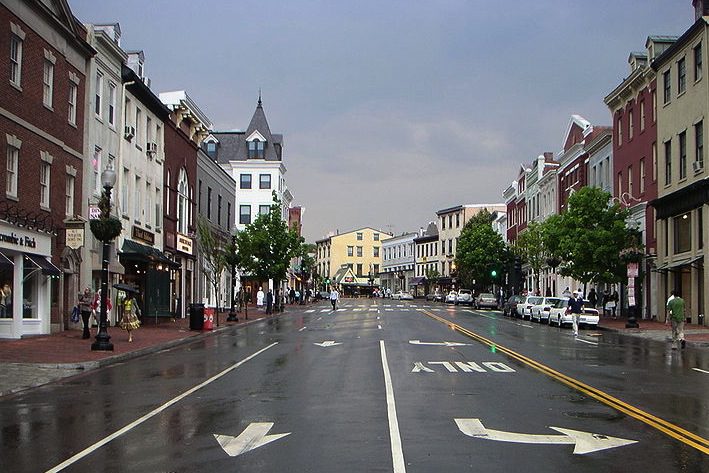Georgetown Main Street Approved
By • September 28, 2017 0 1613

Georgetown small businesses are getting another powerful booster and assistant. A Georgetown Main Street program has been approved by Mayor Muriel Bowser, with its budget allocated by D.C government through a grant from the Department of Small and Local Business Development.
Along with Georgetown, DSLBD designated and funded three other DC Main Streets programs (organizations): Kennedy Street/Upper 14th Street NW (Ward 4); Lower Georgia Avenue (Ward 1); and Minnesota Avenue (Ward 7). By and large, the Georgetown project will cover Wisconsin Avenue from K Street to Whitehaven Parkway.
“We are thrilled to welcome the newest addition to our DC Main Streets family,” said DSLBD Interim Director Tene Dolphin. “The contributions Main Streets programs make to the continued economic growth and prosperity of our city is invaluable. The proven Main Street model will support Georgetown with retention of the longtime businesses that are increasingly at risk.”
The D.C. government expects each Main Street program to “assist business districts with the retention, expansion and attraction of neighborhood-serving retail stores” and to “unify and strengthen the commercial corridor. Each designated program is receiving $175,000 in grant funding and technical assistance to support commercial revitalization initiatives.”
For Georgetown, the organization running the Main Street program is the Georgetown Business Association, whose president, Sonya Bernhardt, is also the publisher of The Georgetowner newspaper.
“I’m elated to share the news that Georgetown Main Street has been approved — after two years of hard work from GBA,” Bernhardt said. “Many people are confused as to why we need a Main Street in addition to the Georgetown Business Improvement District and Georgetown Business Association. Georgetown Main Street is specifically here to help business owners, especially small businesses with limited resources. The first task for GMS will be to develop a strategy to attract the businesses that Georgetown wants and needs. With a strategy in place, we can help existing businesses negotiate with their landlords and help landlords maintain and retain good tenants. We thank Mayor Bowser for recognizing that Georgetown needs more help for its businesses.”
Bowser plans to attend an Oct. 25 grand-opening celebration for Georgetown Main Street.
“It is all about getting feet to the street,” said Martin Smith, executive director of the Barracks Row Main Street, which won the Great American Main Street Award in 2005. A consultant to the GBA on the Main Street process, Smith called for participation from Georgetown’s business owners and accepted the first donation for the proposed Georgetown Main Street from Ed Solomon of Anthony’s Tuxedo and Wedding Creations at a GBA reception in July.
“It’s going to be a huge benefit to the businesses along Wisconsin Avenue,” said Solomon, a GBA board member, of the new Georgetown Main Street. “Many of us have hands-on experience. I believe the relationship between the Georgetown Main Street and the Georgetown Business Improvement District is off to a good start. We have a lot of individual pledges, and we’re excited.”
Main Street funding restrictions are as follows:
1. Up to $55,000 may be spent on the salary of the executive director, who must be hired by Dec. 1, 2017.
2. Up to $25,000 may be spent on administrative costs, including office rental, office equipment, services and other administrative costs.
3. A minimum of $35,000 must be spent on sub-grants to business and property owners. Grantees are expected to hire Certified Business Enterprises (CBEs) to provide all services.
4. A minimum of $45,000 must be spent on other programmatic costs, including contracts for services and advertising. Grantees are expected to hire Certified Business Enterprises (CBEs) to provide all services. As part of other programmatic costs, up to $7,000 may be spent on accounting and professional audit services. Grantees are expected to hire Certified Business Enterprises (CBEs) to provide all services.
5. A minimum of $15,000 must be spent on technical assistance in learning the Main Street Approach from approved practitioners through workshops or other training sessions. Grantees are expected to hire Certified Business Enterprises (CBEs) or approved not-for-profit organizations to provide all services. Up to $1,000 may be spent on professional dues/membership expenses and up to $2,000 may be spent on staff/volunteer travel.
The DC Main Streets grant award is a recurring grant, which can be renewed annually as long as the grantee continues to meet the standards for accreditation by the National Main Street Center. The FY 2018 grant performance period is Oct. 1, 2017, through Sept. 30, 2018.
Including the four newly approved programs, there are now 16 Main Street programs up and running in Washington, D.C. The 2018 active and accredited DC Main Streets programs are: Barracks Row Main Street, District Bridges, Destination Congress Heights, Eastern Market Main Street, Georgetown Main Street, Historic Dupont Circle Main Streets, H Street Main Street, Lower Georgia Avenue Main Street, Minnesota Avenue Main Street, North Capitol Main Street, Rhode Island Avenue Main Street, Shaw Main Streets, Tenleytown Main Street, Upper 14th Street and Kennedy Street, Van Ness Main Streets and Ward 7 Business Partnership.

